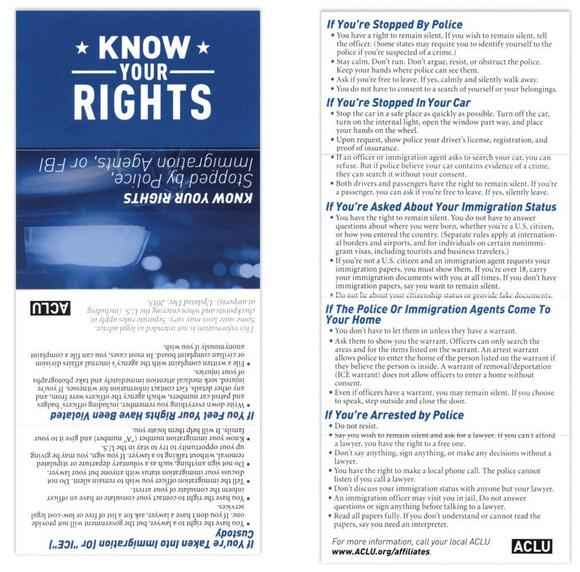YOUR RIGHTS
- You have the right to remain silent. If you wish to exercise that right, say so out loud.
- You have the right to refuse to consent to a search of yourself, your car or your home.
- If you are not under arrest, you have the right to calmly leave.
- You have the right to a lawyer if you are arrested. Ask for one immediately.
- Regardless of your immigration or citizenship status, you have constitutional rights.
YOUR RESPONSIBILITIES
- Do stay calm and be polite.
- Do not interfere with or obstruct the police.
- Do not lie or give false documents.
- Do prepare yourself and your family in case you are arrested.
- Do remember the details of the encounter.
- Do file a written complaint or call your local ACLU if you feel your rights have been violated.
IF YOU ARE STOPPED FOR QUESTIONING
Stay calm. Don't run. Don't argue, resist or obstruct the police, even if you are innocent or police are violating your rights. Keep your hands where police can see them.
- Ask if you are free to leave. If the officer says yes, calmly and silently walk away. If you are under arrest, you have a right to know why.
- You have the right to remain silent and cannot be punished for refusing to answer questions. If you wish to remain silent, tell the officer out loud. In some states, you must give your name if asked to identify yourself.
- You do not have to consent to a search of yourself or your belongings, but police may "pat down" your clothing if they suspect a weapon. You should not physically resist, but you have the right to refuse consent for any further search. If you do consent, it can affect you later in court.
IF YOU ARE STOPPED IN YOUR CAR
- Stop the car in a safe place as quickly as possible. Turn off the car, turn on the internal light, open the window part way and place your hands on the wheel.
- Upon request, show police your driver's license, registration and proof of insurance.
- If an officer or immigration agent asks to look inside your car, you can refuse to consent to the search. But if police believe your car contains evidence of a crime, your car can be searched without your consent.
- Both drivers and passengers have the right to remain silent. If you are a passenger, you can ask if you are free to leave. If the officer says yes, sit silently or calmly leave. Even if the officer says no, you have the right to remain silent.
- Stop the car in a safe place as quickly as possible. Turn off the car, turn on the internal light, open the window part way and place your hands on the wheel.
- Upon request, show police your driver's license, registration and proof of insurance.
- If an officer or immigration agent asks to look inside your car, you can refuse to consent to the search. But if police believe your car contains evidence of a crime, your car can be searched without your consent.
- Both drivers and passengers have the right to remain silent. If you are a passenger, you can ask if you are free to leave. If the officer says yes, sit silently or calmly leave. Even if the officer says no, you have the right to remain silent.

